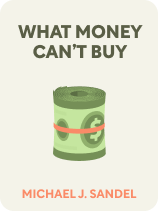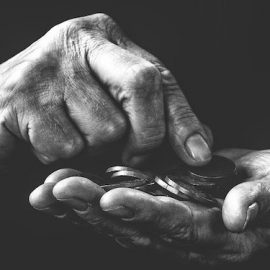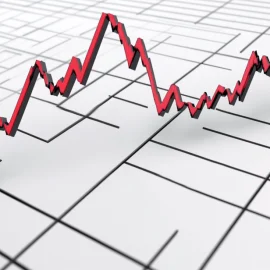

This article is an excerpt from the Shortform book guide to "What Money Can't Buy" by Michael J. Sandel. Shortform has the world's best summaries and analyses of books you should be reading.
Like this article? Sign up for a free trial here .
What are the major disadvantages of a free-market economy? In what way is the price system unjust?
In his book What Money Can’t Buy, philosopher Michael J. Sandel argues that market values have become society’s dominant moral framework, the lens through which we determine what is important or unimportant as well as right and wrong. He argues that the free market is unjust and restrictive because they create injustices and eliminate choice.
Keep reading to learn about the disadvantages of the free-market economy, according to Sandel.
Markets Are Unfair and Restrictive
Sandel mentions two key disadvantages of a free-market society: 1) free markets create inherent inequalities and injustices and 2) free markets often eliminate free choice for people and force them to make dangerous or unethical decisions.
The Injustices of the Price System
Earlier, we explored the pro-market argument that prices represent the fairest and most equitable way to allocate society’s scarce resources. According to this argument, if the price of a good (in a properly functioning market) reflects its true value and someone’s willingness to pay that price reflects how much they value that good, then prices will always get the goods to those who value them most.
However, Sandel writes that the distribution of resources—often essential resources—on the basis of the price system is incompatible with widely accepted moral principles.
He writes that someone’s willingness to pay the asking price for something does not necessarily mean that they need or want it more than someone else, and that, therefore, free markets create inherent inequalities and injustices.
Those with substantial means can afford things they don’t need, while those with insufficient means are unable to acquire basic resources like food, shelter, clothing, or healthcare. While Sandel acknowledges that this may be “efficient” from a purely economic perspective, it is not morally correct for some people to be deprived of things they need while others have more than they can ever consume.
| Conspicuous Consumption and Luxury Taxes Sandel’s idea of rich people being able to afford goods they don’t need—and thereby driving up prices for everyone else—is closely related to what’s known in economics as conspicuous consumption. This is the practice by which consumers demand either a larger quantity or higher quality of goods than they actually need or more than is economically efficient. Conspicuous consumption is often for show—people buy visible, materialistic things to demonstrate their wealth, prestige, or social status to others. Some economists view the existence of conspicuous consumption as a symptom of troubling wealth inequality and a waste of capital that could otherwise be directed toward more economically and socially useful purposes. To correct this problem, many jurisdictions have imposed luxury taxes on expensive goods like yachts, jewelry, private jets, and furs. |
| Shortform Example: Inequality and the US Healthcare System For an example of Sandel’s argument that free markets generate unjust inequalities, we can look to the American healthcare system. In the US, employers contract with for-profit insurance companies to provide health coverage for their employees. These employees then seek treatment from for-profit doctors and nurses at for-profit hospitals and clinics. Unfortunately, people who are either unemployed or who can’t afford to purchase health insurance on the open market have no choice but to forgo treatment—indeed, as of 2018, nearly 28 million Americans had no health insurance at all. And even those Americans who do have insurance often find themselves saddled with surprise six-figure medical bills, sending them into bankruptcy and financial ruin. This goes against what many consider to be a core tenet of medical ethics—that access to healthcare is a fundamental human right that should not be rationed according to someone’s ability to pay for it. |
When Free Markets Aren’t Free
Sandel further argues that “free” markets are often instruments of coercion—pushing people to make dangerous and unethical choices that they would never make without the pressure of having to compete and succeed in the market.
He writes that living in a market society puts individuals and families under constant strain—they need to earn enough money to afford the basic necessities of life like food, shelter, education, and healthcare. Most earn the money they need by selling their labor to an employer. Sandel notes that this type of employment is not necessarily coercive or exploitative—after all, employees are free to leave their jobs whenever they like for any reason they wish.
However, Sandel notes that the pressure of surviving in a capitalist society often puts people in positions where they must, out of sheer necessity, exploit themselves for profit. Since such people are often facing severe material deprivation, they are ripe for such exploitation. He argues that if people are forced into dangerous economic activities—like participating in medical testing for potentially dangerous medications—out of sheer desperation, then they cannot be said to be truly “free.”
| Positive and Negative Liberty Other writers have explored Sandel’s idea that people facing severe economic hardship aren’t “free” in any meaningful sense. Most famously, philosopher and political theorist Isaiah Berlin (1909-1997) argued that there are two types of liberty—positive and negative liberty. Negative liberty is simply freedom from external constraints. As long as you’re not physically or legally prevented from taking a particular action, you enjoy negative liberty. Thus, a supporter of free markets might argue that as long as someone is able to enter into contracts on whatever terms they agree to with another party without interference from an external entity (usually the government), they are free. Positive liberty, however, is defined by a mastery of the self and one’s own destiny. This means having control over your mind, your future, and your material circumstances. Rather than freedom from constraints, it is the freedom to achieve your highest potential. Thus, for example, if you suffer from a disadvantaged social position—whether due to poverty, racial discrimination, or lack of education—you will be unable to realize your destiny and are not truly free, even if there are no formal restrictions standing in your way. Although he doesn’t explicitly mention it, when Sandel writes that people forced into exploitive economic relationships out of desperation aren’t truly free, he is in effect arguing that they lack positive liberty. |
| Selling Your Own Data For an example of this kind of exploitation, we can look to the growing business of people selling their data to tech companies. Specific examples include Facebook paying teenagers $20 per month for unlimited access to their phone activity and Amazon paying people $25 (in Amazon gift cards) for their body scans. While advocates of this practice have hailed it as empowering for consumers—giving them the freedom to treat their consumer, personal, financial, and demographic data as a marketable commodity that they’re free to sell—detractors see it another way. They argue that such schemes are an affront to personal dignity, privacy, and human rights because they transform human beings into data-generating profit points. Further, these schemes create an inherent disparity in privacy between economic classes. If people become desperate enough that they must sell their own data to be harvested, extracted, and resold for profit, then privacy itself becomes a luxury good—available to those who are wealthy enough not to have to commodify their data but denied to everyone else who must, out of necessity, “consent” to sell away their dignity. |

———End of Preview———
Like what you just read? Read the rest of the world's best book summary and analysis of Michael J. Sandel's "What Money Can't Buy" at Shortform .
Here's what you'll find in our full What Money Can't Buy summary :
- How market values are corrupting society's morals
- Why markets lead to the inequitable distribution of essential goods, services, and experiences
- A look at the massive impact of living in a market society







I am satisfied